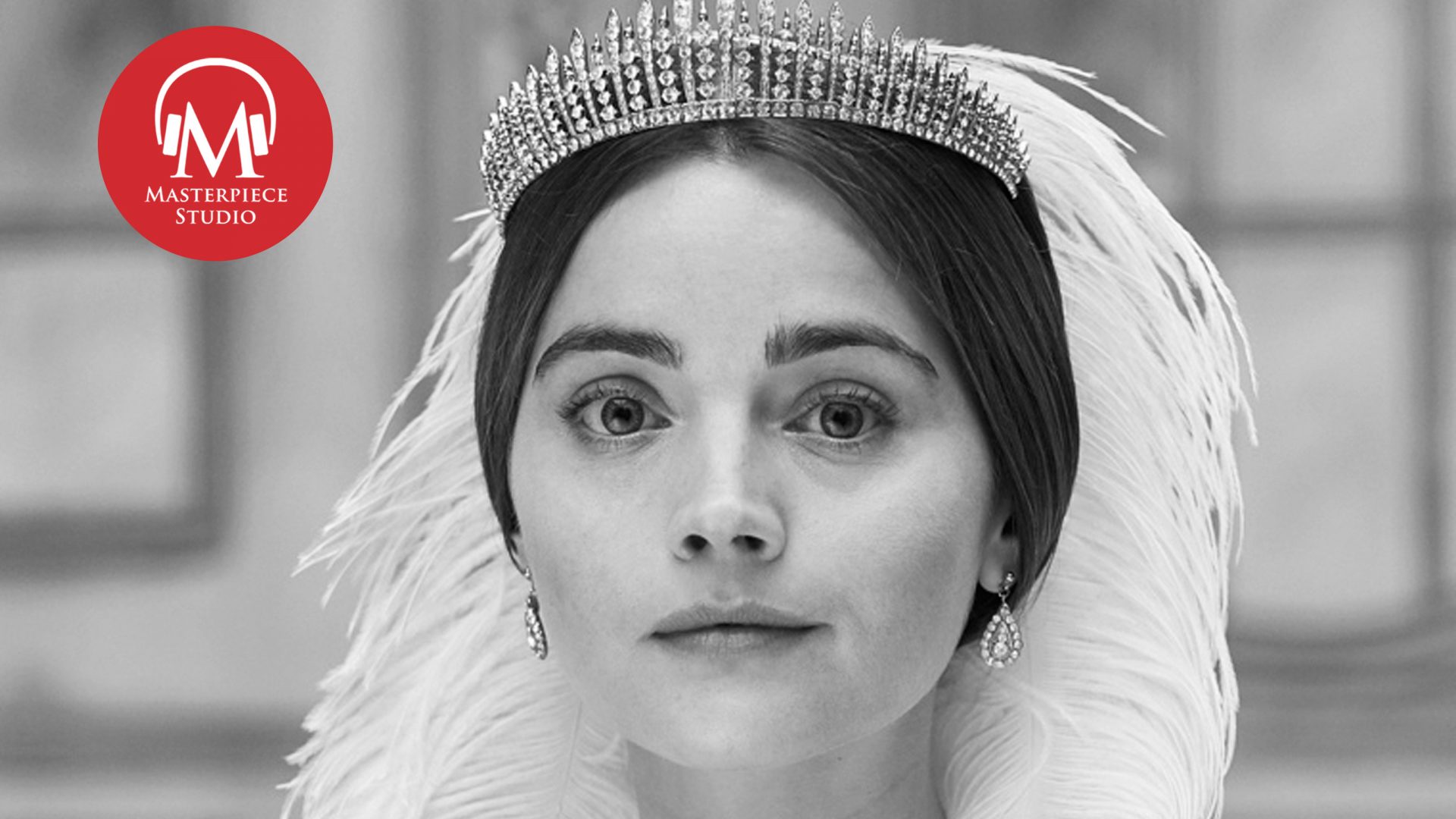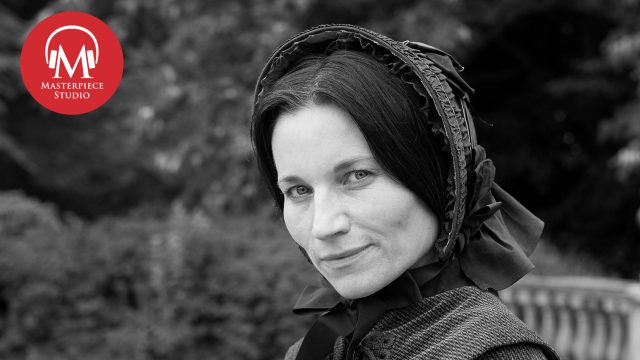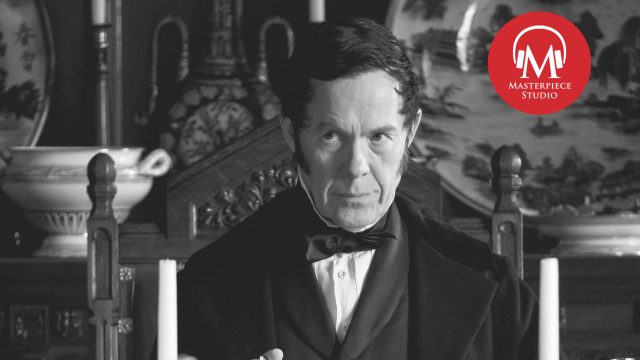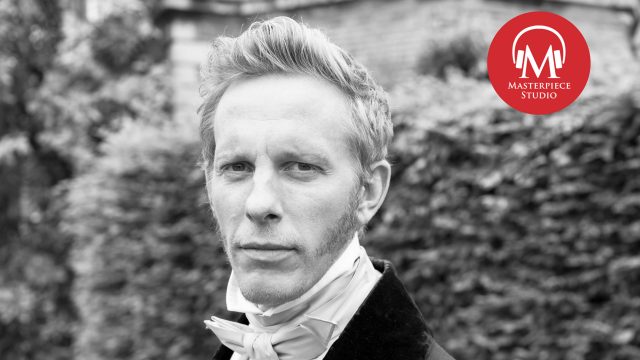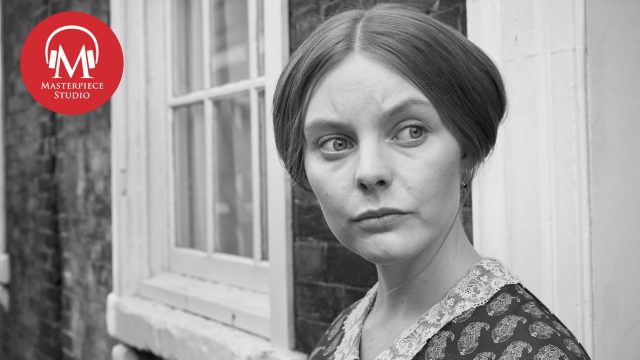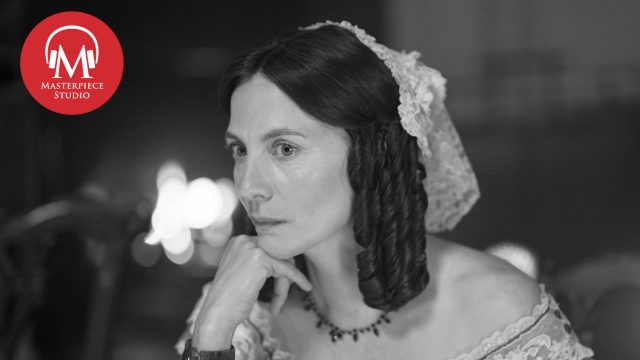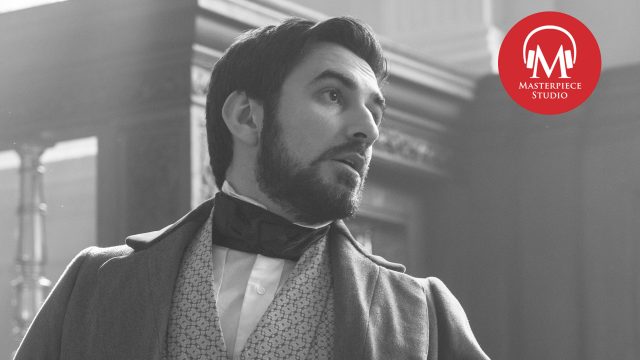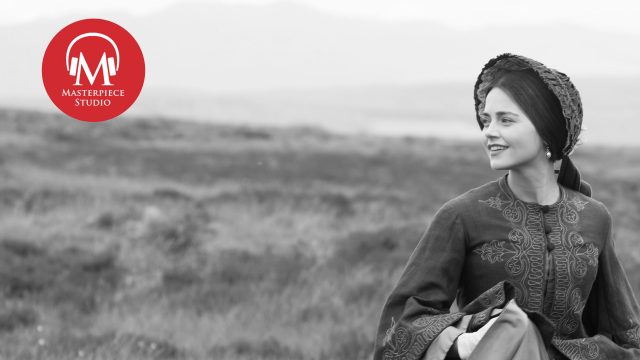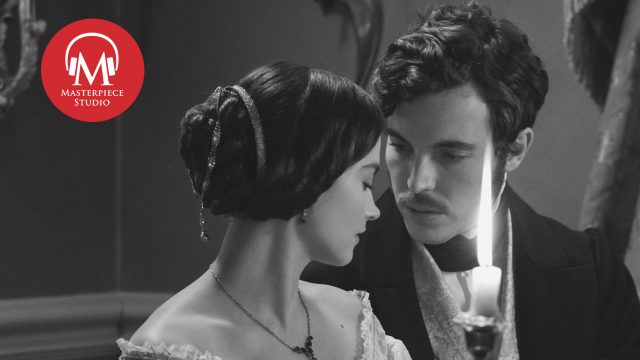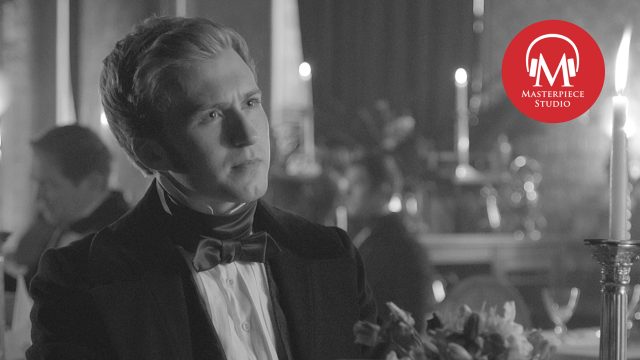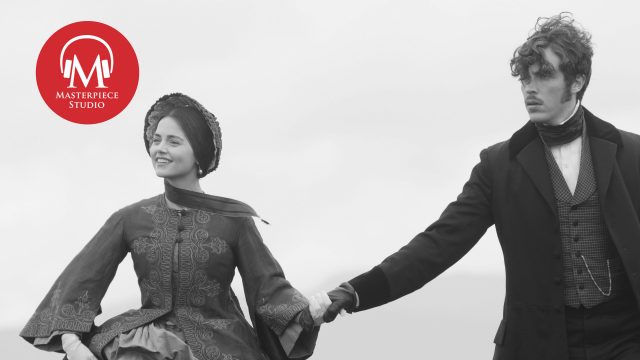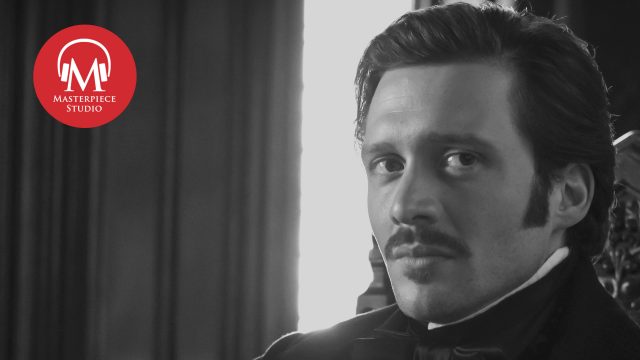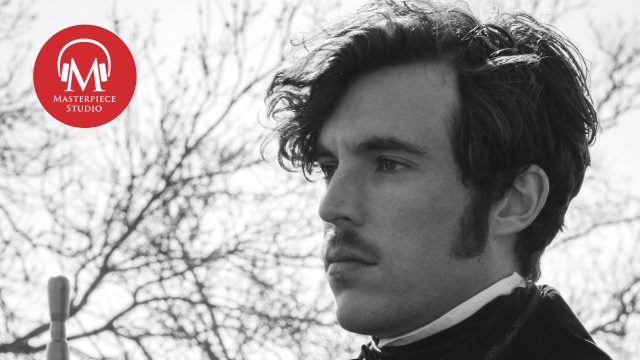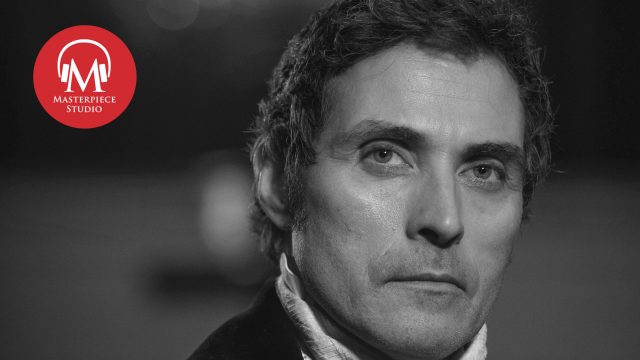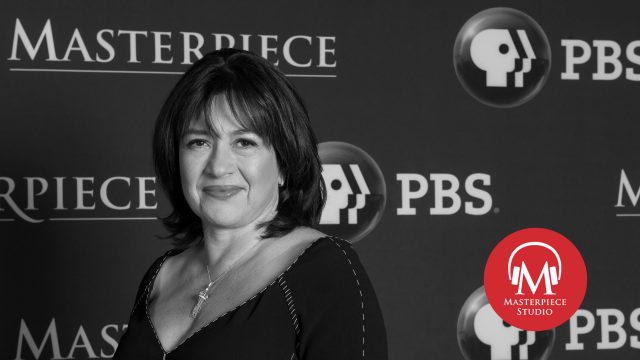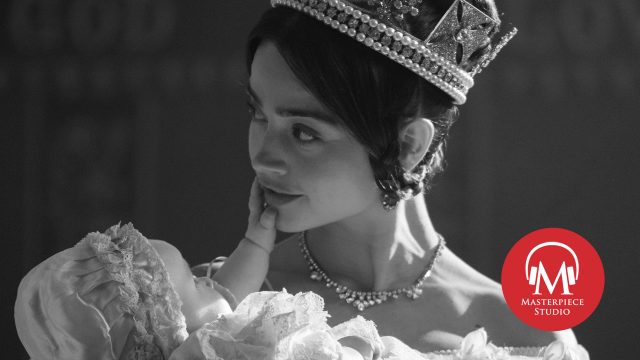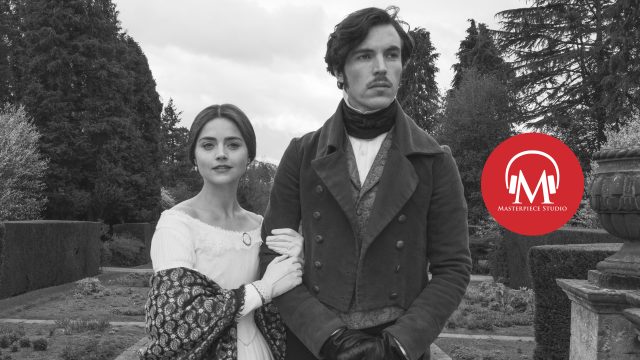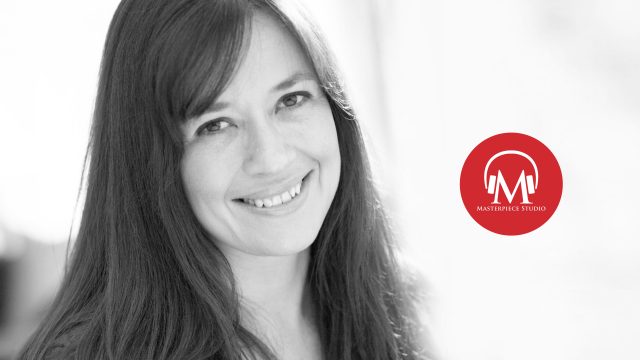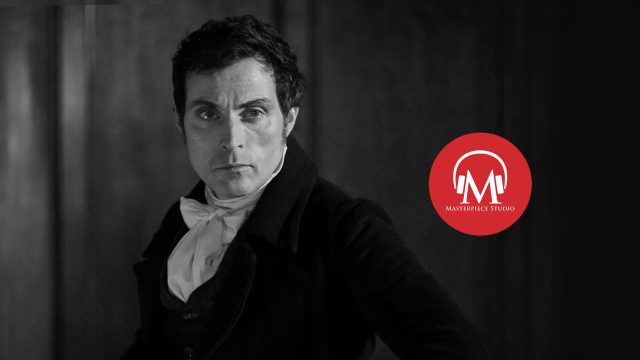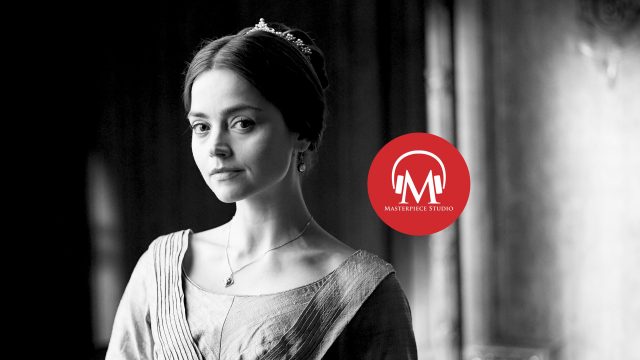Victoria star Jenna Coleman leads a smashing third season of the series, with her royal character growing in roles both maternal and majestic. As the season wraps up, Coleman explores how the young Queen struggles to keep control of her country and her growing family, and reflects on the highlights of a thrilling eight episodes.
Download and subscribe on: iTunes | Spotify| RadioPublic
Transcript
Jace Lacob: I’m Jace Lacob, and you’re listening to MASTERPIECE Studio.
With a triumphant flourish, Queen Victoria and her royal consort, Prince Albert, have officially opened the Great Exhibition of 1851.
CLIP
Victoria: There were many who said this could not be done, but they did not possess the vision of one man: my husband. And his accomplice, Sir Henry Cole, who understood that the nations of the world were ready for this festival of peace. And now, it is with the greatest pleasure that I declare the Exhibition open.
Jace: After a stormy season of anger and anguish, Albert and Victoria seem to have resolved their simmering martial tensions, only for the Prince to collapse in the third season’s final scene.
CLIP
Albert: Ugh…ugh.
Victoria: Albert? Albert! Albert! Albert! Albert!
Jace: Looking back upon this season, Jenna Coleman had much to anticipate as her Queen Victoria continued to grasp the limits of her still young monarchy.
Jenna Coleman: Ultimately she’s four foot eleven and was dainty and became the most powerful woman in the world and had to stand in a room and literally rule. And I think it’s taken her so much to be taken seriously.
Jace: Coleman joins us for the final podcast episode of this third year of Victoria, looking at the Great Exhibition, self-imposed exile on the Isle of Wight, and a season of trouble and romance with the royal couple. And Victoria creator, head writer, and executive producer Daisy Goodwin returns for a final round of Fact or Fiction.
Jace: And this week we are joined by Victoria star Jenna Coleman. Welcome.
Jenna: Hi. How are you?
Jace: Victoria starts off the season pregnant and surrounded not only by her brood, but also by pearls and diamonds while Europe succumbs to revolution. Why does Victoria believe herself to be safe from the uprisings that are occurring on the continent?
Jenna: I think she feels safe because I think it’s beyond her comprehension. I think since the age of around 11, 12 years old, that she’s been told she would be Queen of England and that her future, her path, everything is mapped out for her. So the idea that that could no longer be the case or that she could be overthrown as she’s seen it, as she sees by the man standing in front of her. I mean it kind of shakes her identity, really, to its core. So I think it’s an identity crisis and I think the idea that she could just be overthrown by her people is is beyond what she can think.
Jace: On that note, that does what happened to Louis-Philippe and to Feodora challenge her perceptions of her people or her own responsibilities to them?
Jenna: I suppose what it does, which she’s never really been faced with, is the idea that we’re all replaceable and I suppose she’s taken for granted her whole life that she is loved and supported and wanted, and the idea that she perhaps might not be is incredibly painful, I think, for her.
Jace: It was at times quite distressing to watch Victoria and Albert’s marriage deteriorate this season. How would you categorize their emotional arc this season?
Jenna: I think they’re definitely more disparate. They begin perhaps together, but they have just such different methods when it comes to, well, the day job, and ruling, and politics and they’re very different beings, and in a way they kind of get further and further and further away from one another. I mean, when we meet them back this series, where we end after the Christmas special, where they kind of acknowledge we’re no longer children anymore. And then when we pick up here, their I think sixth child is on its way. They’re kind of about 10 years into their marriage now. Things have changed, they are grown-ups. There’s a lot of children. So I suppose the dynamics of their marriage has has definitely changed.
Jace: It’s a very different side to Victoria than we’ve seen before. She’s been angry in the past, but her fury here is really palpable. She’s smashing busts, she’s slapping Albert, she’s throwing wine in his face. Was it a refreshing change of pace to play Victoria with this sense of rage?
Jenna: Yeah, I mean I always think it’s really interesting because when I first began the series I was like, ‘This doesn’t feel like Victoria Victoria, the Victoria that we know from kind of very obviously from history and from portraits and temperament.’ What I’ve always really looked forward to is, beginning her at the age of 18 where she was a lot more kind of romantic. I mean she is romantic actually and I think she I think at Victoria’s core she always will be, I think she’s a romantic by nature again which might go against you know people’s kind of sense of her, but I think she is. But always working more and more towards that kind of, the Victoria that we know from you know Judi Dench as Mrs. Brown and then later Victoria and Abdul, that Victoria is, there is a lot more of a shorter kind of temper and doesn’t have to really answer to anyone or care what people think. And I’ve always enjoyed playing her pregnant for that reason because I feel like the fuse is shorter and I think as she gets older, she becomes more and more and more that way, her temper definitely becomes pretty short, which I love to play.
Jace: I mean this is an era of restraint and repression. I mean what was it like filming those scenes where Victoria does get more physical, whether it’s the wine in the face or the slap?
Jenna: Yeah, I have to say the phrenology head was very fun to smash.
CLIP
Albert: You wanted the crown!
Victoria: Because I wanted to look like a Queen, but how can I do that when my own husband doesn’t think the fact that I have been anointed by God is important?
Albert: Do you not see that you are contradicting yourself? The etchings, they lower you down to the level of your people, but you are furious because a Latin tag that most of your people cannot even understand, has been omitted from a coin. You have no logic.
Jenna: It’s liberating, and I think it is interesting because it is in a period of, I mean, not only is it a period of restraint, but the job that she has, the kind of the title and what she was born into and bound to is, everything about it is about restraint, and she is not a person who likes restraint very much. So I think I always love that kind of battle.
Jace: I love Victoria’s relationship this season with her children, especially with Bertie and Vicky who’ve blossomed into full characters of their own. How do you think Victoria approaches motherhood at this point?
Jenna: My initial idea of Victoria with motherhood, you know, she’s always been ambiguous about it. I think she’s always fighting with the inner conflict of the natural instincts that she has of loving her children immensely. But also the conflict of, ‘I’ve just got back to work and now I’m pregnant again and physically I have to go through this again. It’s taken me away from my job and people are telling me I am irrational and tired, but I want to be out riding and I want to be free and I want to be independent,’ because I think that’s what she has fought her entire life for, since the Kensington system when she was very little. So she’s always battling with the ambiguity of her own feelings towards her children, but it’s only actually in later life that she really told them, ‘You know, you ruined my first few years of marriage and I thought you look like a frog,’ and you know all of these kinds of things. It’s when she gets older the resentment comes out. And actually, when you read her diaries, I was really shocked because again I was kind of looking forward to playing a mother that isn’t so by nature, so kind of available I suppose. But when you read her diaries, it’s like every other sentence, ‘Bertie said this,’ ‘Affie made me laugh so much today because he did this and this’ and ‘So and so lost a tooth.’ You know these stories about her children and the ladies — I read one of the books about from her lady in waiting and different ladies in waiting and they were saying how, you know, for the time she spent a lot more time with the children than would usual women in the court, so to speak. So again, I think it’s another kind of misconception that she was not a very friendly mother, let’s say. But I think that comes later in her life.
Jace: Victoria confronts the nasty tutor Mr. Cain.
CLIP
Bertie: Ow, ow, ow
Victoria: Get. Out.
Cain: Your Majesty I beseech you.
Victoria: Of this house!
Cain: Allow me to explain the method.
Bertie: Step away sir, you shall not threaten my mother!
Jace: Is that a great reminder of her strength, not just as a monarch but as a parent as well?
Jenna: Yeah, I think so. I mean everything about that I kept for that, I just thinking, ‘Lioness.’ Like lionesses, kind of, it’s all about mother and her cub. And you know, the moment you kind of mess with my children, mate, that was kind of very much the feeling for that scene, it was the the mother lioness popping up. Straight into protection mode, nothing to do with the queen. Complete and utter Mother Nature.
Jace: What I love, too, is that that sense of motherhood, as you say, the sort of lioness applies not only to her own children, but to the nation at large.
Jenna: Yeah.
Jace: I think we see that most clearly when she decides to visit the hospital and see the cholera victims with her own eyes. Does she view herself as both Queen and mother to Britain?
Jenna: Yes, she does. And I think I’m right in saying they did call her mother of the nation. But it’s also, you know, she also was the first queen to be a mother, which is remarkable considering it’s really not that long ago at all. I suppose it’s like, you know, the royal family, if you grow up with them and you go on their trials and tribulations, so people would have seen her, you know, pregnant again, giving birth again. And you know it was also remarkable that she didn’t die in childbirth, because that was…I can’t remember what the percentages are, but that was really, really high. So every time she triumphed and she had another child and another child, her public were kind of going through that with her, I suppose. But I think she felt very keenly and very deeply that transaction between her and the public, for sure.
Jace: Victoria and the royal family leave London for Osborne House on the Isle of Wight amid the chaos in the streets. Why is this move such a painful retreat for her?
Jenna: I think she feels like it’s cowardice, and that she’s turning her back on her people and she’s giving up, and she’s not remaining. And everything in her core wants her to not run away, to remain and to see it through and believe in her people, and she’s advised not to, and again, and she’s heavily pregnant and ultimately has the baby. And then kind of, you know, has to listen to her husband and be the mother and the wife in that moment, and not the queen. And I think that that sits very wrongly in her. And I think she deeply, deeply resents that.
Jace: I love the fact that Victoria isn’t a paragon of virtue. She’s at times very painfully human, such as when she puts away Skerrett’s letter unopened in the fourth episode. Does she do so out of a sense of betrayal, or of self-preservation?
Jenna: I think both. I think it’s not wanting to acknowledge the truth in many ways, not to see it written down, to see it and you know, it’s kind of, put it in a drawer, literally put it in a drawer, it’s not real it’s not there. She’s hurting. And I think when Victoria hurts, she kind of hits out a lot and behaves perhaps not in the most admirable way at times. But again that makes her a lot more interesting to play. She’s a reactive person first and then she kind of has to deal the consequences of her actions or her words. But again it’s the kind of the rhythm of her arguments with Albert, like she will say the worst things in the world to him and he can kind of remain cold and calm. And then ultimately she’s the one banging on his door apologizing saying, ‘I didn’t mean it. I’m so sorry and please,’ you know. It’s just…she’s impulsive.
Jace: There’s a tremendous sense of kindness and love that Victoria shows her former dresser, when she visits Skerrett on her deathbed. ‘I couldn’t dream of a greater honor,’ she says, when Skerrett tells her she intends to name the baby after her. Was this as heartbreaking to film as it is to watch?
Jenna: Well yeah it was, really. It was sad on many levels, because obviously Nell and Ferdie were leaving, they’ve both been there since the beginning and you know, are such brilliant characters in their own right. And to kind of watch you know the blossomings and the beginnings of their relationship and how that story ends was really heartbreaking. But I think in terms of Victoria in the scene, as well, I think it really humanizes her in a way because, she can usually do something, she can usually save the day she can make an order. She can change the situation and ultimately she realizes, the Queen faces cholera, she’s utterly powerless and meaningless and small and she can’t do anything. And to be so impotent in a situation is awful for Victoria, and also I think it definitely puts the world into perspective for her.
Jace: When Nell was on the podcast she told us that you’d given her rather beautiful and perfect going away present. Why was this the ideal going away gift for Nell?
Jenna: So I got for Ferdie I found like a proper Francatelli’s cookbook, one of the real ones with all of his recipes in, and then for Nell, I got her kind of an antique Victorian hairpin. I mean, me and Nell always laugh about the fact that we never look at each other in scenes because we’re always by the dressing table looking in the mirror, and I was like, ‘We’ve never actually, barely, like we’re always talking through a mirror at each other while you’re doing my hair.’ And it’s always like, you know you always get makeup in saying, telling Nell what they can move and can’t move with pins and all of that stuff. So I just thought it was a very fitting kind of goodbye, really. A thank you.
Jace: Well it was perfect. Why is Victoria so incensed by the papers printing the private sketches that she did?
Jenna: It’s really interesting one. There’s a speech in the episode which kind of takes her back, she kind of reverts back to when she first became Queen and everyone told her that she was young, and too inexperienced and a little girl. And I think in a way it’s this little girl complex that she has within her which I think she probably always has had. Because ultimately she’s four foot eleven and was dainty and became the most powerful woman in the world and had to stand in a room and literally rule. And I think it’s taken her so much to be taken seriously and work and kind of fight for her position. So to see herself what she sees as undermined and for people to see the other side of her, which is, this is Victoria as, pure and simple, a mother. And you know, she’s wearing an apron and she doesn’t look like a queen. And I think she really feels that kind of damages this image that she has portrayed of herself in her kind of regality and power and the diamonds and the, you know, a coat of arms and all of the stuff that she’s put around her to represent power and to be taken seriously, she feels suddenly it’s like a pack of cards that’s all undone because you know, they see the real her, which is a mother. And I think it really damages her self-confidence. I think that she says, she’s like, ‘They’re going to see me as a woman now, I will be just a woman.’
Jace: One of my favorite scenes this season is the exquisite Georgian Ball that Victoria throws in episode six to celebrate Arthur’s christening. What was it like filming this very elaborate costumed sequence?
Jenna: Oh my goodness, it was major. It was, I mean, I mean hair and makeup had such a blast, and costume. I’ve got certain photos on my phone with like, you know, the wigs were insane. We’d like birds in them, and ships. There was like a whole model ship in somebody’s wig, which sounds bonkers…it was all pretty bonkers actually. But yeah we could really go to town on this Georgian Ball but the costumes were so…I mean hair and makeup was like three hours a day. So unbelievably heavy. And then we’re doing all of the dances in them as well. It was a lot of fun. I think it was about three and a half, four days filming in the costumes.
Jace: Besides for Albert the other big emotional spine of the season is the fraught dynamic between Victoria and her half sister Feodora. What did you make of their relationship this season.
Jenna: It’s complicated. They have such a complicated relationship but I think Victoria has a complicated relationship with anything and anyone that belongs to Kensington. Her childhood is so part of everything that she does and how she is and how she responds to life it’s impacted her so much. And I think Feodora was privy to what that life was, and she left and left Victoria when she was very young to go get married. And I think it feels like there’s so much love there but there’s so much kind of resentment ad suspicion and they’re both jealous of each other in different ways and it’s a really complicated relationship and I think it’s full of a kind of a lot of hurt and mistrust, but love really, which is kind of what makes it even harder. But Feodora is very much the Iago of our series and you know, she she has a knack, she can make everybody kind of fall in love with her, and she’s the best emotional manipulator and kind of finds her ins and to try and get the emotional reliance of Victoria and then Albert and kind of drive a huge wedge between them.
Jace: Now in this week’s episode Victoria finally stands up to Feo.
CLIP
Feo: No one ever did the best for me.
Victoria: I know you think that I have everything and that you have nothing. But there is one thing I don’t have. A sister.
Jace: Victoria’s struggled with putting her childhood behind her, whether it’s Conroy and the Kensington system or saying goodbye to Lezhen. Is this confrontation with Feo the moment where she’s finally able to free herself in a way that Feo can’t from her past?
Jenna: I suppose in many senses, I suppose it’s her olive branch moment, really but she doesn’t take it. It’s an interesting way, you know, it kind of leads them up to but it’s it’s definitely Victoria offering an olive branch, and I feel like that’s quite a big deal coming from Victoria, because she doesn’t really do that very often. It’s her reaching out, it’s kind of her saying, ‘I need you.’ And that’s for someone who is stubbornly independent, that’s kind of a big deal.
Jace: Before this next question, a brief word from our sponsors…
Jace: There are so many amazing scenes this season between you and Kate Fleetwood, who plays Feo. But my favorite I think has to be the archery sequence in episode seven. How much fun was that to film?
Jenna: It was really fun. It was hilarious. Like in that part of the series, where you know, you were shooting so quickly and then you know you begin with all this, but then because I’m, while we’re filming Victoria, I’m pretty much kind of in and a lot, we didn’t get the prep time ,so the two of us were like, ‘Can you can you can you play archery? Can you play it?’ We had like very quick training session like just before the scene. So we’re both acting like very cool and collected but really our arrows are like going in all sorts of different directions and we’re both trying not to corpse is like what the reality of what that scene is. So we’re acting cool and you’ll see it like hit the bullseye but really it’s like, the crew were like ducking because it’s gonna be like a different direction. So it was incredibly fun scene to play but it’s so rich, it’s kind of something quite dangerous and chess gamey about it. It’s a political scene, in a way. I suppose it’s like Ernst and Albert in their archery scenes, but when you have something to hide behind it’s a kind of distraction technique. You can kind of hit a target. It’s scheming, gaming kind of politics under the surface.
Jace: Feo insinuates Victoria might have inherited her grandfather’s madness or suffers from mental instability after giving birth. Sophie Monmouth’s husband declares her to be insane. Is there a parallel between their struggles, given that unconventional women are often accused of being insane?
Jenna: Yes, for sure. I mean Victoria’s been threatened kind of since she was younger, you know, ‘Hopefully she won’t go the way of the mad grandfather,’ and it’s something that surrounded Victoria her whole life, that, you know, that perhaps because she would show her emotions perhaps she could be mad. I think that’s why she immediately recognizes with Sophie what’s going on and what’s going on very quickly, because I had a brilliant line something about, you know, when ‘Women get called mad when they’re doing something that’s inconvenient.’ And I thought was very interesting.
Jace: Victoria seems keen to push Albert to take over for Wellington as the commander in chief and give up his dreams for this exhibition. What is she so afraid of when it comes to his plans? Is it that she’s concerned about embarrassment for the family, or that he’ll be personally humiliated?
Jenna: Yeah I think it’s personally humiliated I think she’s in full kind of protection mode. I mean his ambitions are so, so, so great. And of that time, then, to try and imagine, ‘OK we’re going to, you know the Great Exhibition, this is what I want to do. Here’s my plan.’ It is so kind of beyond comprehension at that time. It’s so hugely ambitious. I think she just worried for him, worried for him that he would fail somehow or embarrass himself or you know, until until she, you know, very quickly realizes that, you know she believes in him. I think she’s in full protection mode.
Jace: There’s a beautiful moment at the Great Exhibition when Victoria and Albert emerge from the Crystal Palace
CLIP
Crowd: God save the Queen!
Bertie: God save Papa!
Crowd: God save Prince Albert! God save Prince Albert!
Jace: Do you see this as perhaps Albert’s finest moment?
Jenna: Yeah, it truly is. I mean you know it’s where his statue is now in Hyde Park. Daisy always describes him as the Steve Jobs of our time. And he’s someone that kind of sees over the horizon. He is mathematical, scientific, but a complete dreamer, as well, in many ways. And someone who strives and strives and strives and puts the most acute amount of detail into everything which I learned just even seeing Osborne and the way, you know, that house was put together and kind of, you know, how ornate. And he’s kind of truly an artist and in many ways, he’s such an unsung hero. And what he achieved at the Great Exhibition was just, I mean, so much in Victoria’s reign really is down to Albert. And he’s so hugely ambitious.
Jace: That’s what’s amazing to me, that for all of his ambition, his line is heartbreaking when he says to her, ‘I want to remember that I did something right.’
Jenna: Yeah, yeah yeah it is. It really is, it’s his legacy in so many ways. She always has put him on a pedestal, but I mean, he’s like is like truly so deserving of being on a pedestal at this moment. She always calls him my angel in her diaries, my angel Albert, and she wrote that day that truly you know, she always often again, relationships with the crowds, writes about the people and the tears in their eyes and what she saw and how people were cheering and responding and and then she wrote in after the day of the Great Exhibition she said, ‘It was a day to live forever.’ And I just loved that so much, I thought it was so romantic and so moving. And it and it truly truly was, it really revolutionized, it brought so many people together, and the kind of the advances scientifically, manufacturing all across the kind of the globe, it was huge. And Charles Dickens wrote about it when he came. Florence Nightingale was there. I think one of the…was it Jane Austen went as well. It’s really you know, it’s so it’s remarkable what he did. And that’s actually very apt because it’s Albert’s favorite word. It’s remarkable but it truly, truly is. So we managed to get that line in there. I think I had a line saying the world won’t forget this day and I said to Daisy, ‘Oh please can we have this can we add that one line, and I read it,’ and she said, ‘Oh, do it do it do it.’ And so there’s one bit at the end of the series where I turned to him and I say, ‘It was a day to live forever.’ Which I love, I love that because it what she wrote and I found it so poetic.
Jace: Few people have been able to put Victoria in her place as deftly as Lord Palmerston. At the very end of the season they emerge with the sort of hard won friendship I’d say, or at least a mutual respect. How did you view their dynamic over the course of the season?
Jenna: So when you read Victoria’s diaries, and she talks about Lord Palmerston, she hated him. Like, really hated him. I don’t think anyone could infuriate her in the way that Lord Palmerston does. And it’s because I think ultimately they’re quite similar and he’s very popular. She feels very threatened by that, he’s competition but he also, he doesn’t kind of flatter her in the way that other people have. He’s a bit of a lone ranger and I don’t think she likes that at all. Yes, truly she very much disliked him. And I think ultimately as the series goes on they kind of find a bit of a mutual respect and kind of become allies.
Jace: There’s a sense between last season and this one that Victoria is being stripped of their relationships and attachments that she has. Whether it’s Lord M and Lehzen, and this season it’s Skerrett and then Wellington. Is the Queen having to rely on herself more and more?
Jenna: Well I think it’s so sad about it actually, is because actually that’s life, isn’t it? And I think what she is such a symbol of endurance and she remains and remains and along the way she grows close to people and they leave her and she loses them. And. I think you for me that kind of really gives the series and gives me the feeling of time is passing and she’s getting older and she’s growing and along the way you lose people. And I think that’s kind of what’s really, really sad about it is because you’re following, obviously we’re following her since the age of 18, and she loses all these people that are incredibly close to her along the way. But yeah, it is kind of really poignant because I suppose it’s kind of a reflection of of life in many ways and then she grows and she moves into a different phase, a different age and a different I suppose it is, she’s growing up all of the time. You know like from the moment she lost Dash.
Jace: The Great Exhibition is ultimately a smashing success. Victoria and Albert are in this moment finally truly reconciled. They kiss, and then Albert collapses onto the ground unconscious. How difficult a moment was this to shoot, to get into that mindset that you’re finally reconciled and maybe she’s going to lose him, maybe this is it?
Jenna: Well I suppose that shock factor all happened so quick. I love that the way you made that sound was like she kisses him and he collapses, like deathly kiss. But yeah, I suppose in that moment it’s kind of, you know, we leave it mid-scene which I think is a great kind of cliffhanger for the series. So you know, there’s no time to really take in what’s happening, it’s kind of utter like shock, I suppose. Always the shock comes after, very much after the calm, the calm of the kind of their turbulent time that they’ve had together, the kind of the build up of the Great Exhibition and suddenly it’s quiet and it’s calm. The candles are on and down the corridors and it’s back to kind of, you know, and then suddenly we get hit by something else and then we leave that area. So it’s a very clever kind of plot device from Daisy.
Jace: I mean it’s perfect that they’re standing on the very spot where Victoria proposed in the first season back in season.
CLIP
Albert: I could not have done this without you.
Victoria: Oh nonsense, I did everything I could to stop you.
Albert: Not when it mattered.
Victoria: No.
Jace: Is there a sense that their story is coming full circle here before it all goes horribly wrong?
Jenna: I suppose as the beauty of ageing with a character and ageing with a series and taken over so many events and huge events in her life is that you can have those moments where, ‘Wow that was then and look it us now,’ like, you know, we’re grown-ups and we’ve got seven kids and then, you know. But the viewers have been on that journey with you and as you’ve been on it kind of playing those, you know, really crucial moments in somebody’s life and that’s the beauty of a returning series and getting to kind of go through all of those milestones. But yeah there’s definitely something full circle about it, for sure, and I think it is a we almost played on the balcony outside. But it’s actually quite a tricky place to shoot, and Della the director wanted somewhere that photographically was more beautiful. And then it just felt natural that, you know, they wander down to that exact spot where he proposed.
Jace: This is one of those moments where we as the viewers know more than Victoria. I mean we know that Albert’s end is coming in a way that she doesn’t.
Jenna: Yeah.
Jace: How did you read this moment when you read it in the script? Is this sort of the beginning of the end?
Jenna: I’m pretty sure Tom phoned up Daisy straight away and asked if he was being killed off. It was like the first question. He’s like, ‘When you say collapse, is it like a faint?’ No, but I suppose that’s the kind of, you know, what we what we want the audience to think, but it’s a turning point for sure. Because I think with Albert, the kind of the work that he put into the Great Exhibition, after the Great Exhibition for Albert, his health very rapidly went into decline, and I think it was utter exhaustion and utter you know a human working himself to the absolute bone and in many ways. So that definitely had an effect, and happens very quickly. And I kind of see that physically in his appearance. It’s a good way to end the series and I think like we end, the Christmas special with, ‘Yep, we’re no longer kids, we’re grown ups.’ Now it’s kind of like, ‘OK there’s the end of this chapter we’re turning the page into another chapter.’
Jace: Between Victoria and The Cry, You’ve now given birth on screen eight times. How do you get in the right frame of mind for that before shooting a birth scene?
Jenna: I listen to music. I honestly don’t know like it’s really hard to prepare for a birth scene. I mean, I have to say the make up teams are amazing because Nic Collins, hair makeup designer has had children, and she’s like, ‘It’s your back. Remember it’s in your back,’ but I just think it’s such a primal thing. And you know I’ve watched so many birthing videos and things like that but I just think it’s so about adrenaline and the thing with adrenaline is you don’t quite know what you’re going to do, because it’s just pumping and it’s in you. And it’s all I try to do is really build up my adrenaline and kind of I get incredibly nervous and I kind of have loads of caffeine and then I listen to like, really intense music with drums and things like that and then they say, ‘Action!’ and I just see what happens, but it’s kind of it’s all about building adrenaline to me.
Jace: So what’s the ideal birth scene music choice?
Jenna: It’s so embarrassing. I listen to Mumford and Sons and I don’t know why. It’s got all the drums in the band. But this feels there’s something something quite primal in it as well. I don’t know if it’s the beat of the drums and it makes you feel quite alive, let’s say. But yeah there’s something about that which really helps, for some unknown reason.
Jace: It’s all about Marcus Mumford.
Jenna: It’s all about…oh god, no.
Jace: Jenna Coleman thank you so much.
Jenna: Thank you. Nice to chat.
Jace: And we are back with Daisy Goodwin. Welcome!
Daisy: Hi, Jace!
Jace: Can you explain who Louis Napoleon is and why his ascent to power as a self declared Emperor posed such a threat to Britain?
Daisy: Well he’s the nephew of Napoleon Bonaparte, the famous Napoleon, he was Britain’s mortal enemy for 20 years and the fact that he’s come to the throne in France is like a very big deal because suddenly you’ve got a Napoleon on the throne again and France is reasserting itself as a world power. And that always is is an issue for Britain is he going to be an enemy or be an ally? So there’s a real problem here and Albert of course wants to have closer ties to Germany, but Palmerston wants to have close ties to France because his real concern is Russia, and he doesn’t want Russia and France to gang up against Britain. So it’s all about real politic.
Jace: Palmerston’s support for Louis Napoleon is ultimately his downfall in his role as Foreign Secretary. Why is this the one scandal that derails him for now?
Daisy: Because the people see him as being on the side of the tyrant rather than on the side of the people because his support for Louis Napoleon seems to be wrong, because Louis Napoleon has declared himself Emperor. So he’s basically supporting a tyrant, instead of being on the side of the revolutionary French people and that’s what he can’t be forgiven for.
Jace: How concerned was Albert that the Crystal Palace would be viewed as he says a white elephant?
Daisy: Very concerned. I mean right up until the moment that the Crystal Palace opened, you know everybody was predicting it was going to be a disaster rather like when the Olympics were in London in 2012, everyone thought it was going to be a disaster. It was only when they started, that people realized it was going to be the most humongous success. And it was pretty much the same with the Crystal Palace.
Jace: The Crystal Palace has public conveniences which cost one penny to use. Is this the origin of the phrase, ‘Spending a penny?’
Daisy: It most certainly is.
Jace: Was the Crystal Palace and the Exhibition ultimately Albert’s crowning glory?
Daisy: Oh yes I think it probably was. I mean it was such an extraordinary thing. It was such a visionary thing to do. The thing that makes it so amazing is that this time of kind of nationalism and insularity you know, it’s a global exhibition. You know, he’s the one who says, ‘Let’s not make it a domestic thing, let’s make it an international thing let’s welcome other countries in and see the best of what the world has to offer.’ And it’s the first exhibition of its kind. It’s the first time that, you know, anyone has seen all this stuff under the same roof like this you know, incredible innovations like the steam-threshing machine. And you know, there’s a machine that addresses envelopes, and typewriters, really sort of extraordinary things all in this under one roof. It would have been mind-blowing. It was like suddenly having the internet you know I mean it was it was just extraordinary for the time and I think an amazing number, like a tenth of the population of Britain came to see it.
Jace: Fact or Fiction: Was there a plot to make a match between Heidi and Louis Napoleon?
Daisy: That is true but nothing came of it. Yes, there was there was talk of that. Yes.
Jace: And likewise did Bertie actually propose to Heidi?
Daisy: No I’m afraid that’s a fabrication of my part. I couldn’t resist.
Jace: Victoria and Albert are standing upon the same spot where Victoria proposed to Albert, and he falls to the ground in this episode. It’s 1851, still ten years off from Albert’s death in 1861. Is this the beginning of Albert’s declining health or just symptomatic of a general exhaustion?
Daisy: I just wanted to foreshadow, I wanted to hint at the cost that his great efforts for the Great Exhibition had had on him, you know, because everything seems to be wonderful, but actually I think it did undermine his health.
Jace: Then Fact or Fiction: Did he did he actually lose consciousness? And is that based on an actual event?
Daisy: No but there’s some evidence that Albert didn’t die of typhus, but actually had Crohn’s disease, which is a horrible painful disease. It’s quite possible, but you know he quite often was faint, so I’ve used use this for dramatic effect, but I just wanted to play out that the idea that, you know, everything is not quite as good as it seems to be.
Jace: Daisy Goodwin, thank you so very much.
Daisy: Thank you Jace.
Jace: Coming up next on MASTERPIECE, it’s a romance of an entirely different character. Mrs. Wilson tells the true story of actor Ruth Wilson’s grandmother, who discovers her husband’s shocking double life after his death.
CLIP
Gladys: Have I come to the right house? Alexander Wilson?
Alison: Yes.
Gladys: You must be his landlady.
Alison: No, no, I’m his wife. Mrs. Wilson. Alison Wilson. Are you all right? Who are you?
Gladys: Gladys Wilson. I’m Alec’s wife.
Jace: The first episode of MRS. WILSON premieres Sunday, March 31 on PBS. And actor and executive producer Ruth Wilson will join us here on the podcast, too, to discuss how it felt to bring her family’s secret history to life.
Ruth Wilson: The weirdest thing about the whole experience was was playing my grandmother. It did feel quite out of body in moments because I felt out of control in some of those scenes, you can see me, my neck’s really tight, I’m finding it hard to breathe. And there’s an energy that was going through me that I had no control over.
Jace: MASTERPIECE Studio is hosted by me, Jace Lacob and produced by Nick Andersen. Elisheba Ittoop is our editor. Susanne Simpson is our executive producer. The executive producer of MASTERPIECE is Rebecca Eaton.
Victoria Podcasts 20 More Podcasts
MASTERPIECE Newsletter
Sign up to get the latest news on your favorite dramas and mysteries, as well as exclusive content, video, sweepstakes and more.








